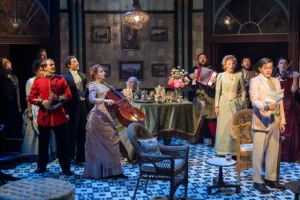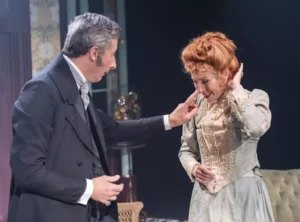This could be the Comedy of the Year
Comedy of the Year?
★★★★

Who would have thought that a forgotten play by a seldom-performed Victorian playwright would be one of the funniest theatre shows of the year?
Arthur Pinero was one of the most popular playwrights of his day- he was even given a knighthood. He made his name with farces and then with more serious plays on social matters like The Second Mrs Tanquery– one of the few that people may have heard of. While he may not offer quite the sharp wit or tight plots of his contemporary Oscar Wilde, Pinero too mocked the Victorian upper class.
I think it’s fair to say his plays haven’t aged as well as Wilde’s, but with a little attention from adaptor Nancy Carroll, The Cabinet Minister scrubs up very well. She’s simplified the story, cut the anachronisms, and added lashings of innuendoes.
What is the plot? Unbeknownst to him, a government minister’s wife and son have run up enormous debts. The latter is a gambler, the former has bought far too many expensive dresses on credit. If the debts aren’t paid, the minister already under pressure to resign, will be disgraced and forced to retire to that fate worse than death (to his wife, anyway) the countryside.
The dressmaker and her moneylender brother intend to use the debts as leverage to gain entry into high society, and, in the brother’s case, to use insider knowledge to make a stock market killing. The wife’s solution is to marry off her children to rich spouses. They have different ideas- they would like to marry for love.
A rollicking farce

So, it has all the ingredients of a comedy of manners and a rollicking farce. Nancy Carroll, director Paul Foster, designer Janet Bird and a well chosen cast have cooked them up into the comedy of the year. Nicholas Rowe plays the government minister Sir Julian Twombley. Tall and patrician, and so cynical about politics he gets his butler to write his speeches, he provides the still centre for the shenanigans.
Nancy Carroll not only adapted the play, she stars as his wife Lady Katherine Twombley. She knows how lucky she is to be part of high society, and doesn’t want that luck to run out. In Ms Carroll’s hands, she carries herself haughtily, throws out barbed one-liners, and panics wholeheartedly, as when she tries to strangle her nemesis Bernard Lacklustre. He’s the main creditor and, played by Laurence Ubong Williams, is a Del Boy character failing at every turn to blend into upper class society.
His sister Fanny Lacklustre is a tradesperson in the morning and a lady in the afternoon, such are the complexities of the class system. Lady Katherine may feel contempt for her, and shows it, but she cannot resist the pressure to bring her into her world. Phoebe Fildes gives a great turn as the thick-skinned schemer, ignoring sleights, ever smiling and pressing on with her plans.
Then there are the children. I particularly liked Rosalind Ford as a naive, confused Imogen Twombley. She is in love with Valentine, a hairy, smelly explorer who won’t settle for domesticity, and played by George Blagden with panache. Unfortunately, her parents have promised her to a rich Scottish laird, Sir Colin McPhail. And here we come to the highest comedy of the evening. Sir Colin is taciturn and shy. Played by Matthew Woodyatt, he’s a lumbering giant ties himself in knots trying to proclaim his feelings, while his mother Lady MacPhail speaks for him and at times the whole of Scotland. Played by Dillie Keane, best known as part of Fascinating Aida, she is an over-the-top Scot forever banging on about the glens and hills of her beloved country.
Attempting to matchmake is Dora, the Dowager Countess of Drumdurris. She constantly appears and disappears through the two doors in classic farce fashion. Sara Crowe was indisposed when I saw the show. While her last minute replacement read the lines well from a script, we lost some of the speed that I am sure was intended by movement director Joanna Goodwin.
Members of the cast play musical instruments. This device is used regularly by The Watermill Theatre and by Pride and Prejudice* (*sort of). It is highly effective in establishing mood and sometimes character and can also help keep us the audience at bay in a play where we are deliberately distanced from being emotionally involved with the characters.
I mentioned Nancy Carroll has packed her adaptation with innuendoes. If you’d like an example, I’ll give you one. At one musical moment, Fanny offers to fiddle with flute playing Sir Julian.
The sets and costumes by Janet Bird are terrific. The Menier stage area is quite small but versatile. On this occasion, the audience is on two sides, creating an intimate drawing room feel. The costumes are sumptuous, looking fin de siecle and subtly reflecting the characters. The Twombleys’ home is decorated minmally but with a chintzy late Victorian style including a chaise longue and of course a piano.
The portrait of high society and its fragility, as well as the seriousness of debt, would have been much more recognisable to a Victorian audience, but we are still a class-ridden society and the characters’ many pretensions hit home. And without it ever needing to be stated explicitly, the references to corrupt politics and donations in exchange for influence show times haven’t changed as much as we might hope. I’m sure the rumours that Lord Ali gave Sir Keir tickets for the opening night are entirely without foundation.
The Cabinet Minister can be seen at The Menier Chocolate Factory Theatre until 16 November 2024.
Paul paid for his ticket.
Click here to watch this review on the YouTube channel Theatre Reviews With Paul Seven
Read what other critics said about The Cabinet Minister


It was awful. Left at the interval, simply not funny unless you are over 90 years old and into Last of the summer wine type shows.